March 23, 2022: This article has been revised slightly to correct a couple of inaccuracies, and to update it.
His Death
On November 8 in 1920, Saint Nektarios the Wonderworker died. The miracles began immediately. Today he is one of the most revered Orthodox saints of the 20th century.
Bishop Nektarios had been ill, so he was taken from the monastery on Aegina to a hospital in Athens. The intern at first could not believe that such a simply dressed man was really a bishop. He was diagnosed with incurable cystitis and placed in a ward for men who were destitute and dying. After about two months in pain, he died. As Saint Nektarios’ body was being prepared to be taken back to Aegina, his shirt was placed on the bed next to him, in which lay a man long paralyzed. The man quickly stood up and began to walk. The room was filled with a sweet fragrance for many days. It has since become a chapel.
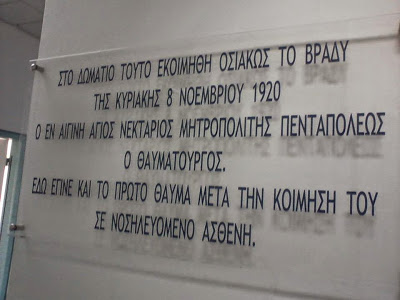
“In this room Saint Nektarios of Aegina, the Metropolitan of Pentapolis and Wonderworker, reposed venerably on the night of Sunday 8 November 1920. Here also he did his first miracle after his repose to a sick man.” Thanks to Orthodox Mystagogy Resource Center for the translation.
His Life
But let’s go back to the beginning. This will be a quick summary of his life and miracles. Many more detailed accounts are available online. If you want the full story get the book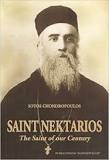 Saint Nektarios: The Saint of our Century available from Amazon and many Orthodox sources.
Saint Nektarios: The Saint of our Century available from Amazon and many Orthodox sources.
Nektarios came from a poor family in the town of Selybria in Thrace, then part of the Turkish empire – born in 1846, baptized Anastasios. When he came of age he went to Constantinople to find work. There is a story that he had no money for a ticket, but the boat would not move till they let him aboard. And that there was a storm on the way, but when Anastasios let his cross down into the sea on a string (within it was a piece of the true Cross), the wind ceased. In the process he lost his cross, but later in the voyage there was a knocking beneath the ship, and when they docked they found the cross stuck to the bottom of the boat. These stories may sound legendary, but they are nothing compared to what would come later.
Young Anastasios loved to read and pray. When he was 29 he became a monk on the island of Chios, then deacon (when he took the name Nektarios) and then went to assist the Patriarch of Alexandria who ordained him as priest and soon made him a bishop. Apparently because the Patriarch recognized his brilliance and gave him “special treatment”, some clergy took a disliking to him and undercut him. I think Nektarios had little use for the intricacies of ecclesiastical politics. Finally they convinced the Patriarch to anathematize him.
Nektarios went to study in Athens, where for a time he lived in poverty. Eventually he was appointed Bishop for Pentapolis on the island of Euboia. But again his enemies from Egypt spread stories about him, and he was removed from office. He returned to Athens, again lived in poverty for some years, till he was appointed head of the School of Theology in Athens. Still his enemies dogged him. Finally in 1910, weary of all this, at the  request of some devout young women he retired to the island of Aegina just off Athens, where he established Holy Trinity Women’s Monastery for them. There he wrote, preached, taught, counseled and heard the confessions of the many who came to him. Yet again some criticized him for this, and a succession of Metropolitans went back and forth about whether the monastery had been properly authorized.
request of some devout young women he retired to the island of Aegina just off Athens, where he established Holy Trinity Women’s Monastery for them. There he wrote, preached, taught, counseled and heard the confessions of the many who came to him. Yet again some criticized him for this, and a succession of Metropolitans went back and forth about whether the monastery had been properly authorized.
Externally Saint Nektarios led not a very significant life. It was lived under a cloud of continual accusation and suspicion, all of which proved untrue and undeserved. These difficulties could have made him angry; instead he gained the virtue of humility. Once a janitor who worked at the School of Theology fell ill and was about to lose his job, which would have meant his family would fall into poverty. Lest that should happen, for an extended time Bishop Nektarios did his work for him secretly, even cleaning the toilets every night, till he recovered. The story came out later. Once his Archbishop came to the monastery on Aegina, saw an old man shabbily dressed, working in the gardens. When he discovered it was Nektarios, he chastised him for doing work “demeaning” to a bishop.
His Miracles
If you saw the 2022 movie “Man of God” about Saint Nektarios, this is what the movie didn’t cover.
After he died, Saint Nektarios’ body was taken to the monastery 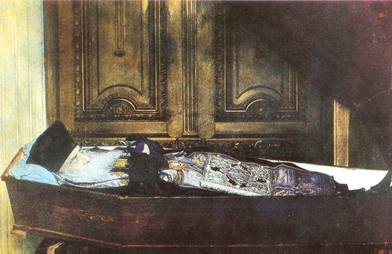 on Aegina for burial, while it continued to exude the fragrance. They buried him in a simple grave, planning to give him better burial in the spring. During the winter he appeared frequently to his nuns as if alive, greatly startling them at first. (In the same way, Saint Anthony still shows up at Saint Anthony’s Monastery in Egypt.) However, they got accustomed to it, as he counseled the gerontissa (abbess) and the others on how to continue in his absence – if you can call that absence! In the spring they opened his grave and were amazed to find his body and even his vestments perfectly preserved, and again the sweet fragrance. Lemon flowers which had been buried with him were still fresh, though they wilted after about 8 to 10 hours.
on Aegina for burial, while it continued to exude the fragrance. They buried him in a simple grave, planning to give him better burial in the spring. During the winter he appeared frequently to his nuns as if alive, greatly startling them at first. (In the same way, Saint Anthony still shows up at Saint Anthony’s Monastery in Egypt.) However, they got accustomed to it, as he counseled the gerontissa (abbess) and the others on how to continue in his absence – if you can call that absence! In the spring they opened his grave and were amazed to find his body and even his vestments perfectly preserved, and again the sweet fragrance. Lemon flowers which had been buried with him were still fresh, though they wilted after about 8 to 10 hours.
After a year and a half and again after three years, according to Greek custom of the time (which still continues in the monasteries), they exhumed his body which should have decayed by now, so that his bones could be put in a vault. But again his relics were found incorrupt and fragrant. After 10 years it was the same. About 20 years later, Saint Nektarios’ grave was again opened, and his body had disintegrated. A woman who had gone to him for confessions was disconsolate, thinking evidence that he was a saint was now gone, till one night she looked up and saw Bishop Nektarios. He explained: I prayed for this, so that some of my relics could be distributed in the world.
Later when his grave was opened again, this time the fragrance was so strong that it could be smelled even on the road way down below the monastery. According to the story, at the time a bus had a flat tire. While it was being changed, it is said that a woman (one account says of dubious reputation) asked what the lovely fragrance was. On being told she went up to the monastery, repented and never resumed her former ways.
According to the story, at the time a bus had a flat tire. While it was being changed, it is said that a woman (one account says of dubious reputation) asked what the lovely fragrance was. On being told she went up to the monastery, repented and never resumed her former ways.
There have been a multitude of miracles both at his shrine and elsewhere, in Greece and around the world. He has been seen from time to time, both in peoples’ dreams and when awake. On the internet, look up “Miracles of Saint Nektarios”, and you will find many testimonies. For example:
1 http://www.sprint.net.au/~corners/Nov98/StNectarios.htm
2 http://www.saintsophiadc.com/2012/11/miracle-of-saint-nektarios-the-healing-of-fr-nektarios-vitalis-of-cancer/
3 Here is an account from a Byzantine (Eastern rite) Roman Catholic (!) source: http://www.byzcath.org/forums/ubbthreads.php/topics/396038/Appearance_of_St_Nektarios
It is said that if people don’t recognize him, he may identify himself – though at other times people don’t discover who it was till later. He may tell them to add a few drops of the oil from the lamps which burn in his chapel to their drinking water. His specialty is curing cancer – or otherwise he provides a good death.
In all my trips to Greece, I think I have never seen a church that did not have a prominent icon of Saint Nektarios. Devotion to him is widespread around the world. During the Proskimidi (the priest’s preparation for Divine Liturgy), the Liturgikon of our Antiochian Archdiocese of North America three “Wonderworkers” are commemorated: Saint Nicholas, Saint Spyridon and Saint Nektarios – quite a “promotion” for such a recent saint.
Sainthood
On April 20, 1961, the Ecumenical Patriarch of Constantinople declared 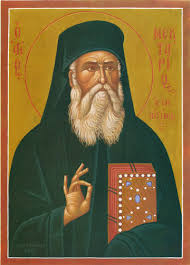 Nektarios to be a saint worthy of veneration and fixed his feast day as November 9, so as not to interfere with the November 8 celebration of the Archangels Michael and Gabriel. This reflected the usual Orthodox method of declaring sainthood. First the people recognize men and women as saints, venerate them, ask for their help and report miracles. Then in due time the hierarchs conclude this must be “for real” and announce what everybody already knows. Finally in 1998 the Synod of the Patriarchate of Alexandria formally lifted the anathema they had placed on him (it took them long enough!) and apologized to him for the way their predecessors had treated him.
Nektarios to be a saint worthy of veneration and fixed his feast day as November 9, so as not to interfere with the November 8 celebration of the Archangels Michael and Gabriel. This reflected the usual Orthodox method of declaring sainthood. First the people recognize men and women as saints, venerate them, ask for their help and report miracles. Then in due time the hierarchs conclude this must be “for real” and announce what everybody already knows. Finally in 1998 the Synod of the Patriarchate of Alexandria formally lifted the anathema they had placed on him (it took them long enough!) and apologized to him for the way their predecessors had treated him.
His chief relics still lie at the monastery on Aegina. I visited there about ten times, and each time there were many pilgrims. There is an ineffable light about the place, even on dark days – a peace, a joy, a sweetness. I love it there.
Lesser relics have been distributed around the world. We are blessed to have a small relic of Saint Nektarios at Saint Nicholas, Cedarburg, which we bring out for veneration on November 9 and other times as appropriate. We have a small shrine to Saint Nektarios, and it is clear that many of our people now turn to him.
My Experiences with Saint Nektarios
Let me quickly tell you how I came to know and love this blessed saint. If you’ve been reading this Blog you’ve heard all this before – Posts 7, 12, 19, 24, 34, 47, 60, 81, 131, 142, and there’ s still one more to come – if you want to check them out. I’m writing what’s below for the sake of newcomers. Besides, I just love to talk about Saint Nektarios, so please humor me.
It began in 2000, I think, when our parishioners Tony and Chris Wood came back from Greece, and Tony (+ memory eternal) brought me a copy of Saint Nektarios: The Saint of our Century and told me what a wonderful place Saint Nektarios’ shrine was. He said he couldn’t get it into words. I read the book, and when I came to the part where the miracles began I got the holy chills and knew I had to go there.
So in 2002 I did. After leaving Mount Athos and then recovering from a bad cold, I had one short day to get out to Aegina, visit Nektarios, get back to Athens, return to the hotel for my luggage, and then make it back to Piraeus the port of Athens, because I had ferryboat reservations overnight to Crete. For some reason I had stupidly not looked up how to get to the shrine when I got to Aegina. So I missed the 9 o’clock boat, the 10 o’clock was cancelled, and I sat there on the dock feeling disconsolate, and heard myself saying “Saint Nektarios, I want to visit you. Help.” And I guess he did. Then followed a startling series of “coincidences”: A monk whom I met on the boat got me a free ride to the shrine and a guided tour. Some other people paid my way back to Aegina port, where an ice cream shop provided me with a double chocolate sundae (my favorite, though I didn’t even know what’s what I had ordered!) and I got back to Athens with about 4 hours to spare. I should mention that I was not dressed in clerical garb, so that didn’t merit me any special attention. As the day went on, all this seemed less and less like coincidence. It felt more like someone was behind it. After all I had asked him for help. I kept saying “Thank you, Saint Nektarios” and smiling for many days after.
I love Greece for itself, but also I just had to visit Saint Nektarios again. Thank God that by this time we had the money, and my parish council was very generous with time off. Thus began many more strange “coincidences” on successive trips to Greece.
In 2004 a series of very unlikely metro and ferry connections got me to Aegina 2 hours early.
In 2005 the taxi got me back to the hotel just minutes before a cloudburst; the flooded streets would have stranded me at the port.
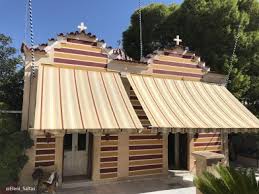 In 2006 as I sat on the bench outside Saint Nektarios chapels, suddenly there beside me sat a couple I had known well in Wisconsin 25 years before when we were Episcopalians. Now they were Orthodox, too. That seemed too “coincidental” to be a coincidence.
In 2006 as I sat on the bench outside Saint Nektarios chapels, suddenly there beside me sat a couple I had known well in Wisconsin 25 years before when we were Episcopalians. Now they were Orthodox, too. That seemed too “coincidental” to be a coincidence.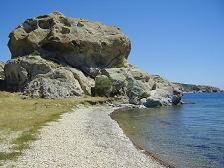
In 2007 on Patmos I went to an isolated beach (to study Revelation, believe it or not) with necessities carefully packed, each in its proper bag. I climbed back up to the car, and the car key was not in the bag! I searched everything three times. No key. Out of my mouth came an unplanned unmannerly “Nektarios! Help!” I reached into the bag and the key was right on top.
In 2008 our luggage vanished as we changed planes in Montreal. By now I was catching on and, after panicking for a while, calmly said, “Saint Nektarios, help”. Our luggage arrived 15 minutes before our plane left to Greece.
Later that trip on Crete I forgot to buy petrol, and 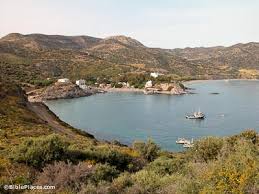 drove to Kali Limenes (“Fair Havens” in Acts) where Saint Paul’s ship stayed for a while – an isolated place 25 miles from a gas station. I looked and the gauge showed about 1/16 full. I had no idea what to do, so this time I automatically said “Saint Nektarios, help me!”, explored for an hour and tried to relax. When I came back the tank was 1/3 full!
drove to Kali Limenes (“Fair Havens” in Acts) where Saint Paul’s ship stayed for a while – an isolated place 25 miles from a gas station. I looked and the gauge showed about 1/16 full. I had no idea what to do, so this time I automatically said “Saint Nektarios, help me!”, explored for an hour and tried to relax. When I came back the tank was 1/3 full!
By now it was just automatic to talk to Nektarios, so in 2009 I said to him, “No more tricks this time. You’ve got my attention”. And I didn’t get any then, and for several succeeding years.
In 2014, I believe it was, the miracle was to have Khouria Dianna there with me for the first time. Why? Looking back, it was preparation for something. .
Which was this: In the year 2015 Dianna had aggressive cancer. Her oncologist was competent and hopeful, but of course we were very frightened. We had many people praying for her. We bombarded Saint Nektarios. I prayed his Paraklisis every day. The result:
In 2016 the two of us visited Saint Nektarios together again! Thank you, Saint Nektarios! And she has been cancer-free ever since.
There was one more lesser “coincidence” yet to come in 2015, which I’ll write up soon.
With my scientific background, I can’t help being a skeptic. I just am. I want a preponderance of evidence. OK…. I got it! All this was just too much to be coincidental. In the process I’ve learned to love and trust and turn to Saint Nektarios the Wonderworker.
Let’s go back:
When Tony (who first put me on to this blessed saint) was dying, because of Saint Nektarios I knew what to say. I told him: Tony, just hang onto that feeling you had at Saint Nektarios – the peace, the light, the happiness, the joy you felt when you were there – because that’s where you’re going. Heaven will be like that.
My days of traveling are over now – my days of visiting Saint Nektarios are over. He’s on the wall in my icon corner looking at me as I pray from my chair. He’s beside my bed, where every night I ask him to pray for me. But I wish… I wish I could go back to Greece and visit him again there.
When my time comes, I’ll cling to our Lord Jesus, of course, and Saint Nicholas who has done so much for me. But there is also someone else I will hang onto. And I hope when I finally get there I will know that wonderful feeling of joy, peace, light, joy – Heaven. For I think that’s what always shines through at Saint Nektarios Monastery in Greece.
Thank you, Saint Nektarios.
Next week: from the sublime to the disgusting – Scandals in the Church
In 2 weeks: just in time for parish financial “pledging” for 2019 – The Theology of Giving

Very nice story about St Nektarios; one can almost feel his holy presence!
Thankyou & God bless!
Thank you for introducing me to yet another wonderful saint!
Am I also correct in remembering that St Nektarios composed the hymn “O Virgin Pure”? I love that one…
Yes, you are. If I’d been smart I’d have included it in that Post.
It’s hard to fathom that the church had to wait almost 2000 years to receive that hymn!
That means there are more good things to come over the next 2000 years! Unless Christ returns before then – one may hope.
I wonder if this wonderful saint will hear my prayers. I want to be Orthodox, but there are things in the way right now. Perhaps he will intercede for me to enter the Church by making things happen to open the way.
Dear Edward: Yes, keep turning to him. When I first knew I should be Orthodox, there were also “things in the way”. I had to pray and be patient – and frustrated! – for a few years. But here I am now, thirty years in the Orthodox Church. Looking back, waiting was a blessed time for me, gradually entering into the Light. I’ll pray for you to Saint Nektarios and the Lord. Sometimes God’s answer to our prayers is “wait a while”, for reasons only He knows.
St. Nektarios and Fr. Bill,
Please pray for my neighbor Elizabeth. She has cancer of the brain.
She has a husband and two beautiful children. Please St. Nektarios
come and visit Elizabeth. Through the prayers of the Mother of
God, Oh Savior save us.
Br. Paul ☦️🙏
I’m so sorry to hear this. Keep praying to our Lord Jesus, His Mother, and Saint Nektarios, that God’s will be done. That’s all we can do. We never know what He wills, but we do know that His will is to bring good out of all things – whether in this life or the next.
I’m adding my poor prayers – have Elizabeth on my daily prayer list. Please let me know how things are going. And tell Elizabeth she is being prayed for.